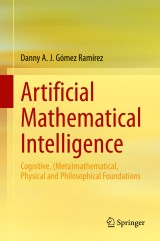Details

Artificial Mathematical Intelligence
Cognitive, (Meta)mathematical, Physical and Philosophical Foundations|
53,49 € |
|
| Verlag: | Springer |
| Format: | |
| Veröffentl.: | 23.10.2020 |
| ISBN/EAN: | 9783030502737 |
| Sprache: | englisch |
Dieses eBook enthält ein Wasserzeichen.
Beschreibungen
<p></p><p>This volume discusses the theoretical foundations of a new inter- and intra-disciplinary meta-research discipline, which can be succinctly called <i>cognitive metamathematics</i>, with the ultimate goal of achieving a global instance of concrete Artificial Mathematical Intelligence (AMI). In other words, AMI looks for the construction of an (ideal) global artificial agent being able to (co-)solve interactively formal problems with a conceptual mathematical description in a human-style way. It first gives formal guidelines from the philosophical, logical, meta-mathematical, cognitive, and computational points of view supporting the formal existence of such a global AMI framework, examining how much of current mathematics can be completely generated by an interactive computer program and how close we are to constructing a machine that would be able to simulate the way a modern working mathematician handles solvable mathematical conjectures from a conceptual point of view. </p><p> </p><p>The thesis that it is possible to meta-model the intellectual job of a working mathematician is heuristically supported by the computational theory of mind, which posits that the mind is in fact a computational system, and by the meta-fact that genuine mathematical proofs are, in principle, algorithmically verifiable, at least theoretically. The introduction to this volume provides then the grounding multifaceted principles of <i>cognitive metamathematics,</i> and, at the same time gives an overview of some of the most outstanding results in this direction, keeping in mind that the main focus is human-style proofs, and not simply formal verification. </p><p>The first part of the book presents the new cognitive foundations of mathematics’ program dealing with the construction of formal refinements of seminal (meta-)mathematical notions and facts. The second develops positions and formalizations of a global taxonomy of classic and new cognitive abilities, and computational tools allowing for calculation of formal conceptual blends are described. In particular, a new cognitive characterization of the Church-Turing Thesis is presented. In the last part, classic and new results concerning the co-generation of a vast amount of old and new mathematical concepts and the key parts of several standard proofs in Hilbert-style deductive systems are shown as well, filling explicitly a well-known gap in the mechanization of mathematics concerning artificial conceptual generation.</p><p></p>
1. Global Introduction to the Artificial Mathematical Intelligence General Program.- 2. Some Basic Technical (Meta-)Mathematical Preliminaries for Cognitive Mathematics.- Part I. New Cognitive Foundations for Mathematics.- 3. General Considerations for the New Cognitive Foundations' Program.- 4. Towards the (Cognitive) Reality of Mathematics and the Mathematics of (Cognitive) Reality).- 5. The Physical Numbers.- 6. Dathematics: A Meta-Isomorphic Version of "Standard" Mathematics Based on Proper Classes.- Part II. Global Taxonomy of the Fundamental Cognitive Mathematical Mechanisms Used in Mathematical Research.- 7. Conceptual Blending in Mathematical Creation/Invention.- 8. Formal Analogical Reasoning in Concrete Mathematical Research.- 9. Conceptual Substratum.- 10. (Initial) Global Taxonomy of the Most Fundamental Cognitive Mechanisms Used in Mathematical Creation/Invention.- Part III. Toward a Universal Meta-Modeling of Mathematical Creation/Invention.- 11. Meta-Modeling of Classic and Modern Mathematical Proofs and Concepts.- 12. The Most Outstanding (Future) Challenges Toward Global AMI and its Plausible Extensions.
<p>This volume discusses the theoretical foundations of a new inter- and intra-disciplinary meta-research discipline, which can be succinctly called <i>cognitive metamathematics</i>, with the ultimate goal of achieving a global instance of concrete Artificial Mathematical Intelligence (AMI). In other words, AMI looks for the construction of an (ideal) global artificial agent being able to (co-)solve interactively formal problems with a conceptual mathematical description in a human-style way. It first gives formal guidelines from the philosophical, logical, meta-mathematical, cognitive, and computational points of view supporting the formal existence of such a global AMI framework, examining how much of current mathematics can be completely generated by an interactive computer program and how close we are to constructing a machine that would be able to simulate the way a modern working mathematician handles solvable mathematical conjectures from a conceptual point of view. </p><p></p><p>The thesis that it is possible to meta-model the intellectual job of a working mathematician is heuristically supported by the computational theory of mind, which posits that the mind is in fact a computational system, and by the meta-fact that genuine mathematical proofs are, in principle, algorithmically verifiable, at least theoretically. The introduction to this volume provides then the grounding multifaceted principles of <i>cognitive metamathematics,</i> and, at the same time gives an overview of some of the most outstanding results in this direction, keeping in mind that the main focus is human-style proofs, and not simply formal verification. </p><p>The first part of the book presents the new cognitive foundations of mathematics’ program dealing with the construction of formal refinements of seminal (meta-)mathematical notions and facts. The second develops positions and formalizations of a global taxonomy of classic and new cognitive abilities, and computational tools allowing for calculation of formal conceptual blends are described. In particular, a new cognitive characterization of the Church-Turing Thesis is presented. In the last part, classic and new results concerning the co-generation of a vast amount of old and new mathematical concepts and the key parts of several standard proofs in Hilbert-style deductive systems are shown as well, filling explicitly a well-known gap in the mechanization of mathematics concerning artificial conceptual generation.</p>
Sets the multidisciplinary foundations of Artificial Mathematical Intelligence and Cognitive Metamathematics Provides both classic and new results concerning the (artificial) co-generation of old and new mathematical concepts filling a conceptual gap in the mechanization of mathematics Describes computational tools allowing for calculation of formal conceptual blends Presents extensions and new cognitive characterizations of the Church-Turing thesis
Diese Produkte könnten Sie auch interessieren:

Linear and Integer Programming vs Linear Integration and Counting

von: Jean-Bernard Lasserre

96,29 €

Reactive Search and Intelligent Optimization

von: Roberto Battiti, Mauro Brunato, Franco Mascia

96,29 €














